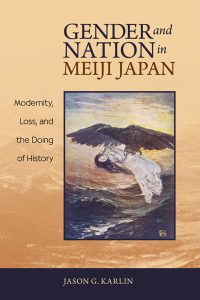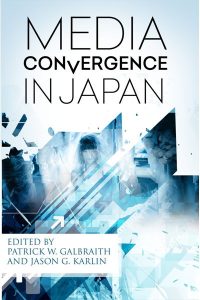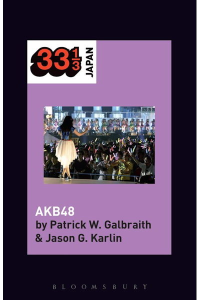The University of Tokyo
Interfaculty Initiative in Information Studies
Jason G. KARLIN, Ph.D
ジェイソン・G・カーリン
Professor
Media Studies, Social Media Analytics, Computer Mediated Communication
- The Hills of Edo (江戸の坂): A Geolocation-based Mobile Game Exploring Tokyo’s Historical Hills. iOS app. Swift. Released 2025.
- GirlsinSight: A Sentiment Analysis Tool for GirlsChannel.net. Google Chrome extension. Javascript. Released 2025.
Publications
Books
- AKB48, co-authored with Patrick W. Galbraith (London: Bloomsbury, 2019).
- Gender and Nation in Meiji Japan: Modernity, Loss, and the Doing of History (Honolulu: University of Hawaii Press, 2014). ↓
Edited Books
- Mathieu Deflem, Hiroshi Takahashi, Dimitri Vanoverbeke, and Jason G. Karlin, eds. Law and Culture in Japan: Institutions, Justice, and Media (Bingley, UK: Emerald Publishing, 2025).
- Patrick W. Galbraith and Jason G. Karlin, eds. Media Convergence in Japan (Ann Arbor, MI: Kinema Club, 2016). ↓
- Patrick W. Galbraith and Jason G. Karlin, eds. Idols and Celebrity in Japanese Media Culture (London: Palgrave, 2012).
Journal Articles
- “The Gender of Nationalism: Competing Masculinities in Meiji Japan,” The Journal of Japanese Studies 28.1 (Winter 2002): 41-77. ↓
- “Gender, Nationalism, and the Problem of Ideology in Women’s History,” Social Science Japan Newsletter 30 (December 2004): 5-7.
Book Chapters
- “Media Incitements in Japan: Social Contagion, Self-Harm, and Freedom of Expression,” in Mathieu Deflem, Hiroshi Takahashi, Dimitri Vanoverbeke, and Jason G. Karlin, eds. Law and Culture in Japan: Institutions, Justice, and Media (Bingley, UK: Emerald Publishing, 2025).
- “Introduction: At the Crossroads of Media Convergence in Japan,” in Patrick W. Galbraith and Jason G. Karlin, eds. Media Convergence in Japan (Ann Arbor, MI: Kinema Club, 2016), 1-28. ↓
- “Precarious Consumption After 3/11: Television Advertising in Risk Society,” in Patrick W. Galbraith and Jason G. Karlin, eds. Media Convergence in Japan (Ann Arbor, MI: Kinema Club, 2016), 30-59. ↓
- “Introduction: The Mirror of Idols and Celebrity,” in Patrick W. Galbraith and Jason G. Karlin, eds. Idols and Celebrity in Japanese Media Culture (Basingstoke: Palgrave Macmillan, 2012), 1-32. ↓
- “Through a Looking Glass Darkly: Television Advertising, Idols and the Making of Fan Audiences,” in Patrick W. Galbraith and Jason G. Karlin, eds. Idols and Celebrity in Japanese Media Culture (Basingstoke: Palgrave Macmillan, 2012), 72-93. ↓
- “Narratives of Heroism in Meiji Japan: Nationalism, Gender, and Impersonation,” in Andrea Germer, Vera Mackie, and Ulrike Woehr, eds. Gender, Nation, and State in Modern Japan (London: Routledge, 2014), 48-67.
- 「近代日本の青年のバンカラと暴力」 (Japanese Youth Culture and the Rise of Male Primitivism and Violence in Modern Japan), in Katō Chikako and Hosoya Minoru, eds. 『ジェンダー史叢書、第5巻: 社会秩序の暴力、戦争』 (Gender History Series, vol. 5: The Social Order of Violence and War) (Tokyo: Akashi Shoten 赤石書店, 2009), 196-200.
- “The Tricentennial Celebration of Tokyo: Inventing the Modern Memory of Edo,” in Yamaji Hidetoshi and Jeffrey E. Hanes, eds. Image and Identity: Rethinking Japanese Cultural History (Research Institute for Economics & Business Administration, Kobe University, 2004), 215-227. ↓
CV
Academic Positions
2022-Present
2012-2022
2008-2012
2003-2008
2002-2003
2001-2002
Professor, Interfaculty Initiative in Information Studies, University of Tokyo
Tenured Associate Professor, Interfaculty Initiative in Information Studies, University of Tokyo
Associate Professor, Interfaculty Initiative in Information Studies, University of Tokyo
Associate Professor, Institute of Social Science, University of Tokyo
Assistant Professor, Department of History, The University of Florida
Visiting Lecturer, Department of History, Michigan State University
Education
2002
1996
1992
Ph. D. in History, University of Illinois at Urbana-Champaign
M.A. in History, University of Illinois at Urbana-Champaign
B.A. in Asian Studies, University of Illinois at Urbana-Champaign
Other Professional Activity
2024
2020-Present
2014-2025
2021-2024
2014
2008-Present
2003-2008
McCausland Visiting Scholar, Department of Sociology, University of South Carolina
Editor and Web Designer, Japanese Media and Popular Culture
Advisory Board Member, InVisible Culture: An Electronic Journal for Visual Culture
Information, Technology, and Society in Asia (ITASIA), Program Director
“The World Hobbit Project” (with Martin Barker, Matt Hills, and Ernest Mathijis)
International Editorial Board Member, Social Science Japan Journal (Oxford UP)
Managing Editor, Social Science Japan Journal (Oxford UP)
Teaching
ITASIA 301: Research Methods and Ethics (Lecture/Methods)
A1A2
(October-January)
This class explores the diverse methodologies and ethical considerations essential for conducting research in the social sciences. The course covers a wide range of topics, including textual and systematic content analysis, qualitative survey design, media ethnography, and research ethics. Students will explore the intricacies of digital databases, media archives, and the basics of web scraping. Advanced techniques in web scraping and social media analytics will be discussed, with particular attention to sentiment analysis and data visualization. The course emphasizes the ethical dimensions of research, ensuring that students are well-equipped to conduct their studies responsibly and effectively. Through a series of lectures and practical workshops, students will gain a thorough understanding of contemporary research methods and their application in the study of information, technology, and society in Asia.
- Introduction and How to Find Sources (Hisano)
- How to Use Sources: Textual and Visual Analysis (Hisano)
- Coding Media Representations: Understanding Content Analysis (Karlin)
- Understanding Audiences: Qualitative Survey Design (Karlin)
- Research Ethics for Qualitative Social Science Research (Karlin)
- Media Ethnography (Fujita)
- Web Scraping of Media Archives and Online Databases (Karlin)
- Programatic Web Scraping (Karlin)
- Data Aggregation, Transformation, and Integration with API (Karlin)
- Sentiment Analysis, Text Classification, and Topic Modeling (Karlin)
- Data Visualization and Social Media Analytics (Karlin)
- Research Design (Karlin)
- Quantitative Methods: Descriptive Statistics and Linear Modeling (Shibuya)
- Advanced Social Media Analytics (Shibuya)
ITASIA 201: Media and Communication Studies: Theory and Practice (Discussion/Theory)
A1A2
(October-January)
This graduate-level seminar provides a comprehensive exploration of contemporary media and communication studies, emphasizing the intricate relationship between theory and practice in our rapidly evolving digital landscape. The course navigates key paradigms in media and cultural studies, from classic frameworks to cutting-edge concepts, equipping students with a robust theoretical foundation while encouraging critical engagement with real-world media phenomena. Through in-depth readings, lively discussions, and applied analysis, students will develop the critical thinking skills necessary to interrogate complex media texts, platforms, and practices using a range of theoretical approaches. By bridging the gap between abstract ideas and concrete media practices, the course prepares students to understand the historical development and current state of media and communication studies, apply theoretical frameworks to emerging technologies, and develop original research questions that contribute to the field. This seminar serves as a foundation for fostering the ability to engage in informed discussions about the role of media in shaping society, culture, and individual experiences. Students will emerge from the course well-equipped to analyze and interpret the complex media ecosystems that characterize our contemporary world, laying the groundwork for advanced research and analysis in the field.
- Introduction to Media and Cultural Studies
- Structure and Agency in Media Worlds
- The Frankfurt School and Culture Industries
- The Semiotics of Popular Culture
- Audience Studies and Media Reception
- Political Communication and the Public Sphere
- Reproduction and Authenticity
- Software and Platform Studies
- Big Data and Datafied Embodiment
- Artificial Intelligence and Deep Learning
- Mediated Communication and Interpersonal Relations
- Precarity and Affective Labor in the Gig Economy
- Life and Death in the Anthropocene
ITASIA 221: Gender and Media Theory
S1S2
(April-July)
This course critically examines the intersections of gender, sexuality, and feminism through the lens of media theory, with a focus on how cultural and technological contexts shape and contest these categories. Drawing on diverse theoretical frameworks and case studies, the course explores themes such as gender socialization, body politics, performativity, and intersectionality. By engaging with foundational texts alongside contemporary analyses, students will interrogate how media representations reinforce or subvert normative discourses surrounding identity and power. The course emphasizes comparative perspectives, including cross-cultural studies of media in Japan, China, and the broader global context, to highlight the dynamic interplay between local specificities and transnational feminist debates. Through an interdisciplinary approach, the course challenges students to critically assess the role of media in constructing and negotiating identities, from traditional platforms to digital environments. Special attention is given to emerging issues such as social media self-representation, digital feminism, and the commodification of gendered labor. By combining theoretical inquiry with applied analysis, students will develop tools to articulate nuanced critiques of media texts and practices, fostering a deeper understanding of the ways in which gender and media are mutually constitutive. This class offers an engaging environment for developing original research projects that contribute to ongoing academic and public discourse on gender and media.
- Sex and Gender
- Gender Socialization
- Body Image and Body Dysmorphia
- Gender Performativity
- Social Media, Gender Identity, and Self-Esteem
- Masculinity in Crisis
- Motherhood, Work, and Family
- Sexuality, Biopolitics, and Power
- Censorship, Fantasy, and the Regulation of Desire
- Pornography
- Singlehood and Marriage
- Intersectionality
- Feminism and Gender Discontent
ITASIA 222: Social Media, Computer-Mediated Communication, and Mediated Publicness
S1S2
(April-July)
- As we increasingly come to live our lives online in digital mediated spaces, the image of the self becomes more plastic, performative, and contingent. Anthony Giddens argues that the self in post-modernity becomes a reflexive project—an enterprise that we work and reflect on in order to fashion the story of who we are, how we came to be, and what we hope to become. Like celebrities in film and television, we have become the performers of our own lives for dispersed audiences across multiple media platforms. In the process, the distinction between our public and private lives becomes increasingly difficult to maintain, necessitating, like public relations, the careful management of our self-image. Our followers and friends become the audience in a staged performance that demands the constant cultivation of attention through self-disclosure, exhibitionism, and emotional labor. In digital spaces—with the intimacy of communication mediated by platforms, algorithms, and interfaces—how do we express feelings and immediacy, pursue social and relationship goals, or understand politics and world events? What impact does living our lives online have on our identity, self-esteem, communication, and sense of community? In this assemblage of the human and non-human, how are the social affordances of technology shaping our posthuman futures?
- Introductions (GRWM)
- Technologies of Addiction (Pay to Win)
- The Social Power of Algorithms (What I Eat in a Day)
- The Media Interface (Don’t Forget to Hit Like)
- Authenticity and the Performance of the (Ideal) Self (7 Days, 7 Looks)
- Visual Communication on Social Media (#beautiful)
- The Cruel Optimism of Life Lived Online (You Got This!)
- Affective and Digital Labor (Feeling Burned Out)
- Platform Studies (The Free Speech Wing of the Free Speech Party)
- Disinformation and Fake News (Pants on Fire)
- Manipulation, Mobilization, and Social Influence (The Internet Made Me Do It)
- Digital Authoritarianism (Move Fast and Break Things)
- Object-Oriented Ontology (Good Bot)
- Disconnection (Taking a Break)
ADvising
Doctoral Dissertation Direction
- Alexandra Hambleton (Associate Professor at Tsuda University), “Consuming Pleasures: Women, Sexuality, and Postfeminism in Post-Growth Japan,” 2017.
- Adrienne Johnson (Associate Professor at Shirayuri University), “Historicizing Visual Kei in Post-Bubble Japan: The Fluidity of Subculture in Consumer Society,” 2023.
- Jiaxi Hou (Research Fellow at Royal Melbourne Institute of Technology), “Reassembling Class in Digital China: Inequality, Technology, and Agency from Below,” 2024.
- Junxiao Leng, (Adjunct Instructor, Waseda University), “Wrath of Silence: Reimagining Feminist Strategies, Coalitions, and Intersubjectivity in Japan,” 2025.
- Frédéric Seraphine (Senior Game Designer, Klab Japan), “Emergent Languages: Designing for Communication with Artificial Agents,” 2025.
Current Ph.D. Candidates
- Jia Yang, “Transnational Mobilities and Popular Culture: International Tourism and Migration among Chinese Fans of Japanese Male Idols“ (until Sept. 30, 2026).
- Xindi Qin, “Technology, Marriage and Identity: The Platformitization of Love and Romance in China” (until Mar. 31, 2027).
- Antonia Beatrice Dans Lee, “Remembering and Revolting: Voltes V, Collective Memory, and the Philippines.”
Masters Thesis Direction
- Michelle H. S. Ho, “Japan’s Gendered Morning Television: Housewives, Social Identity, and ‘Wide-Show’ Infotainment,” 2012.
- Hui Chong Yong, “Fukushima on 24-Hour Television News: A Case Study of News as Narrative in Crisis Coverage,” 2012.
- Cathleen Paras, “Informal Media Economy and Remediation: Fansubbing of Japanese Dramas in the Philippines,” 2013.
- Kai Okudara, “Idol Chatter: A Cross-Platform Analysis of Celebrity Social Media Usage in Japan,” 2013.
- Elitza Koeva, “A Different Space: A Globalising Architectural Firm in Contemporary China,” 2013.
- Mizhelle Agcaoili, “Bickering Bitches: An Analysis of Representations of Japanese Femininity through Celebrity,” 2014.
- Fengming Ni, “Rotten Girls in Love: Funü, Fantasy, and Female Sexuality in Contemporary China,” 2014.
- Christopher St. Louis, “For Your Protection: State Surveillance and Narratives of Risk in Contemporary Japan,” 2014.
- Mario Rico Florendo, “Hoops and Dreams: Analysis of Kuwentong Gilas Narratives and National Identity in the Philippines,” 2015.
- Tiffany Lim, “All the Internet’s a Stage: Online Photo-Sharing as a Performance of Self-Esteem and Impression Management in the Filipino Cosplay Community,” 2015.
- Emma Winthrow, “Behind the Camera, In Front of the World: YouTube Vlogs and Messages of Japan to the West,” 2016.
- Xuguang Li, “The Next MOOC Through the Lens of Gamification: A Study of Chinese Users,” 2016.
- Heqi Qiu, “Audience Reception of Micro-Celebrities on Weibo: Urban Users’ Following Behavior of Micro-Celebritites and Its Influences on Their Buying Decisions,” 2016.
- Nicole Hasbum, “Social Media and the Tourist Experience,” 2017.
- Siyan Zhao, “Making Sense of Japanese Violence: Chinese Audience’s Reading of TV News Reports of the Sagamihara Stabbings,” 2017.
- Jiaxi Hou, “Chinese Participatory Culture on a Danmaku Website: Technology, Content, and Interactivity,” 2017.
- Liron Afriat, “Fight Like a Girl: Cosplay in the Work-Life Balance of Japanese Female Cosplayers,” 2018.
- Yue Yang, “From Phoenix to Dragon: Tsai Ing-wen’s Branded Femininity on Social Media,” 2019.
- Chencheng Qian, “Fascination or Discrimination: The ‘Occidental’ Accent in Japanese TV Commercials,” 2019.
- Harley Harrer, “Multicultural Future: An Ethnography of Gaijin Drag Queens in Tokyo,” 2020.
- Liisi Tagel, “’‘What If I Will Be Single Forever?’: Discourses of Female Singleness in Japanese Women’s Magazines,” 2020.
- Yechen Yu, “The Archive of Our Own: Between Platform and Infrastructure,” 2020.
- Andrew Z Le, “Does the Party Ever Stop? Rethinking Regulation and Resistance of Tokyo Nightclubs,” 2020.
- Chujun Zhao, “Only Fans Can Understand? Television in the Age of Social Media,” 2020.
- Jiani Liu, “Conflict and Camaraderie in Women-Only Space: Investigating Japanese Joshikai,” 2020.
- Sisi Gu, “The Contemporary “Happy Housewife Myth”: Japanese Housewife Ideal and Commercialized Domesticity on YouTube,” 2020.
- Xueqin Lu, “Neoliberal Feminism and Consumerism in Contemporary China: A Discourse Analysis of the ‘Straight Male’ on the Chinese Internet,” 2021.
- Sabah Merchant, “‘Do Your Best!’: Representations of Ganbaru in 21st-Century Sports Manga Franchises,” 2021.
- Callum Sarracino, “The Omegaverse: Canine Zoomorphism in Homoerotic Media,” 2021.
- Rongqiu Jin, “Socializing Through Music: Chinese Online Music Platforms in the Streaming Era,” 2021.
- Chan Gao, “Childhood Aesthetic Education in the Rural Vitalisation of China: Understanding “Place” in Xiuwu County, Henan Province,” 2022.
- Antonia Beatrice Dans Lee, “Weathering the Storm: Understanding the Process of Identity Negotiation Among Fans Following the Loss of a Fan Object,” 2022.
- Chenyu Zhao, “’Unruly’ Housewife YouTubers in Japan: Changing Representations of Gender, Domesticity, and Family Structure,” 2022.
- Li Yi, “Are ‘Doll Mothers’ Real Mothers? How Young Chinese Women Negotiate Their Identity as Fertile Women in Contemporary Chinese Society,” 2023.
- Allison Kathleen Lee, “Staging the Periphery: Revitalizing the Japanese Countryside Through Contents Tourism,” 2023.
- Pan Yuye,“’Shout into the Air’ Bots and the Proliferation of Carnivalesque Memetic Subculture on Chinese Social Media,” 2023.
- Yangfang Wang, “At the Expense of One’s Health: The Digital Labor of Self-Employed Chinese Female Influencers in Online Eating Shows,” 2024.
- Siyi Yang, “Dressing in JK Uniforms Online and Offline: How Chinese Female Consumers Negotiate Identity,” 2024.
- Tomoka Suga, “Femtech Entrepreneurship in Japan: Defining ‘Women’s Work’ in a Newly Emerging Technology Field,” 2024.
- Yang Xu, “Violence, What Violence? Exploring Aggression in K-pop Boy Group Music Videos and Its Reception by Young Chinese Female Fans,” 2024.
- Fan Candra Xia, “Yuri Invited: The Representation of Female Same-Sex Intimacy in Chinese Television Dramas,” 2024.
- Yishu Wang, “Empowerment or Entrapment? Couple Pairing Culture and Chinese Feminist Discourse in the Digital Media Age: A Case Study of Sha-Tou Fans,” 2025.
- Cuiwei Liu, “Female Characters, Gender Narratives, and National Discourse: Media Representations of Women in China’s Poverty Alleviation Dramas,” 2025.
- Cindy de Montaigne, “(In)Visibility, Diversity, and Representation in the Japanese Modeling Industry: The Case of Mixed-Japanese Models,” 2025.
- Yusi Zheng, “On the Border of Casual: ‘Happy Everyday Obligations,’ Ambient Play, and the Ludic Identity of Chinese Female Mobile Gamers,” 2025.





